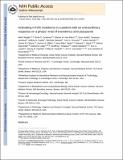Activating mTOR Mutations in a Patient with an Extraordinary Response on a Phase I Trial of Everolimus and Pazopanib
Author(s)
Wagle, N.; Grabiner, Brian C.; Van Allen, E. M.; Hodis, Eran; Jacobus, S.; Supko, J. G.; Stewart, M.; Choueiri, T. K.; Gandhi, L.; Cleary, J. M.; Elfiky, A. A.; Taplin, M. E.; Stack, E. C.; Signoretti, S.; Loda, Massimo; Shapiro, G. I.; Gabriel, Stacey B.; Kantoff, Philip W.; Garraway, Levi A.; Rosenberg, J. E.; Sabatini, David; Lander, Eric Steven; ... Show more Show less
DownloadLander_Activating mTOR.pdf (1.404Mb)
OPEN_ACCESS_POLICY
Open Access Policy
Creative Commons Attribution-Noncommercial-Share Alike
Terms of use
Metadata
Show full item recordAbstract
Understanding the genetic mechanisms of sensitivity to targeted anticancer therapies may improve patient selection, response to therapy, and rational treatment designs. One approach to increase this understanding involves detailed studies of exceptional responders: rare patients with unexpected exquisite sensitivity or durable responses to therapy. We identified an exceptional responder in a phase I study of pazopanib and everolimus in advanced solid tumors. Whole-exome sequencing of a patient with a 14-month complete response on this trial revealed two concurrent mutations in mTOR, the target of everolimus. In vitro experiments demonstrate that both mutations are activating, suggesting a biologic mechanism for exquisite sensitivity to everolimus in this patient. The use of precision (or “personalized”) medicine approaches to screen patients with cancer for alterations in the mTOR pathway may help to identify subsets of patients who may benefit from targeted therapies directed against mTOR.
Date issued
2014-03Department
Massachusetts Institute of Technology. Department of Biology; Whitehead Institute for Biomedical ResearchJournal
Cancer Discovery
Publisher
American Association for Cancer Research
Citation
Wagle, N., B. C. Grabiner, E. M. Van Allen, E. Hodis, S. Jacobus, J. G. Supko, M. Stewart, et al. “Activating mTOR Mutations in a Patient with an Extraordinary Response on a Phase I Trial of Everolimus and Pazopanib.” Cancer Discovery 4, no. 5 (March 13, 2014): 546–553.
Version: Author's final manuscript
ISSN
2159-8274
2159-8290